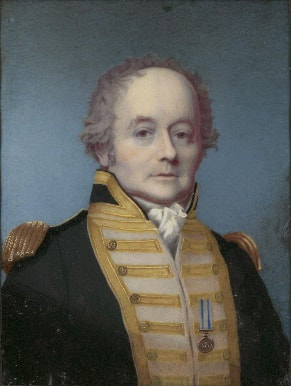 Captain William Bligh - Source: Wikipedia
Captain William Bligh - Source: Wikipedia Captain William Bligh, Hero or Villain, was the subject of our first session as we tried to decide to what extent he was responsible for the mutiny on the Bounty in 1789.
Bligh was always an ambitious, parsimonious man given to violent tempers and abuse of his crews. Despite this he was not a flogging Captain and controlled most of his sea voyages successfully. Bligh’s early experiences as a merchant navy captain taking his father-in- law’s ships to the British slave colonies of the Caribbean; his naval service under James Cook; and his later service in the war with the French all passed without serious incidents.
The Bounty voyage however presented a number of problems that were different from any he experienced on other voyages. The Bounty was seriously overcrowded even by C18 standards because a great portion of its lower deck was made over as a nursery for the breadfruit plants that were to be obtained from Tahiti. Bligh had taken on a lacklustre crew of midshipmen, many of whom were not fully competent as able seamen and so could not control or teach skills effectively to the common sailors. Bligh was parsimonious with rations as he was purser in addition to being Captain, a most unusual combination. Bligh had agreed to a huge reduction in salary from £500 to £50 for his services as he expected to make money from the plantation owners when he delivered the breadfruit to the Caribbean. These and other issues including his vicious outbursts and demand for perfection from his crew created an atmosphere of uncertainty that infected the ship, finally resulting in the mutiny after the ship left Tahiti after a five month stay to collect the plants.
The film “Rogue Nation” demonstrated the amazing feat of navigation he performed in getting the small cutter crowded with eighteen loyal crew to Timor after the mutineers cast them off from the Bounty. Finally, most of us agreed that a complex mix of circumstances was the likely cause of the mutiny along with his temperament and inability to keep the respect of the crew.
Next session we will look at the development of the young colony of New South Wales, its increasingly complex social mix and the staging of the Rum Rebellion against Bligh as Governor. Here Bligh met his nemesis, the invincible John Macarthur. The clash of the two inflexible and opinionated men brought the young colony to its knees and was the first of several rebellions as the colony started to develop in ways unanticipated by the British government.
Meg Dillon
Bligh was always an ambitious, parsimonious man given to violent tempers and abuse of his crews. Despite this he was not a flogging Captain and controlled most of his sea voyages successfully. Bligh’s early experiences as a merchant navy captain taking his father-in- law’s ships to the British slave colonies of the Caribbean; his naval service under James Cook; and his later service in the war with the French all passed without serious incidents.
The Bounty voyage however presented a number of problems that were different from any he experienced on other voyages. The Bounty was seriously overcrowded even by C18 standards because a great portion of its lower deck was made over as a nursery for the breadfruit plants that were to be obtained from Tahiti. Bligh had taken on a lacklustre crew of midshipmen, many of whom were not fully competent as able seamen and so could not control or teach skills effectively to the common sailors. Bligh was parsimonious with rations as he was purser in addition to being Captain, a most unusual combination. Bligh had agreed to a huge reduction in salary from £500 to £50 for his services as he expected to make money from the plantation owners when he delivered the breadfruit to the Caribbean. These and other issues including his vicious outbursts and demand for perfection from his crew created an atmosphere of uncertainty that infected the ship, finally resulting in the mutiny after the ship left Tahiti after a five month stay to collect the plants.
The film “Rogue Nation” demonstrated the amazing feat of navigation he performed in getting the small cutter crowded with eighteen loyal crew to Timor after the mutineers cast them off from the Bounty. Finally, most of us agreed that a complex mix of circumstances was the likely cause of the mutiny along with his temperament and inability to keep the respect of the crew.
Next session we will look at the development of the young colony of New South Wales, its increasingly complex social mix and the staging of the Rum Rebellion against Bligh as Governor. Here Bligh met his nemesis, the invincible John Macarthur. The clash of the two inflexible and opinionated men brought the young colony to its knees and was the first of several rebellions as the colony started to develop in ways unanticipated by the British government.
Meg Dillon

 RSS Feed
RSS Feed
